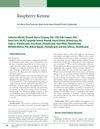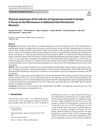26 citations,
August 2008 in “Clinical endocrinology” The document concludes that more multidisciplinary research is needed to understand and treat PCOS, a condition that significantly affects women's health and quality of life.
 18 citations,
June 2019 in “Clinical research in dermatology”
18 citations,
June 2019 in “Clinical research in dermatology” Acne can't be cured but can be managed with treatments like benzoyl peroxide and diet changes; it's costly and can lead to scarring and mental health issues.
8 citations,
January 2019 in “Nanomedicine” Egyptian researchers are advancing in pharmaceutical nanotechnology, potentially improving health outcomes and the economy.
January 2025 in “Anais Brasileiros de Dermatologia” Male pattern baldness worsens with age and can be treated with medications like minoxidil and finasteride, but side effects and personalized care are important.

Certain drugs can worsen hair loss in people prone to androgenetic alopecia.

There are many ways to treat Polycystic Ovary Syndrome, including lifestyle changes, surgery, and various medications, but more research is needed for better treatments.
March 2023 in “Clinical, Cosmetic and Investigational Dermatology” Spironolactone can effectively treat hair loss with manageable side effects.
January 2023 in “Dermatologic Therapy” Intralesional corticosteroids and 5-alpha-reductase inhibitors are the best treatments for frontal fibrosing alopecia.
 6 citations,
April 2013 in “Alternative and Complementary Therapies”
6 citations,
April 2013 in “Alternative and Complementary Therapies” Raspberry ketone lacks sufficient human research to support health benefit claims and requires more rigorous studies to confirm its safety and effectiveness.
 30 citations,
January 2000 in “Dermatologic Clinics”
30 citations,
January 2000 in “Dermatologic Clinics” Finasteride and minoxidil are effective FDA-approved treatments for androgenetic alopecia.
 January 2007 in “The Year book of dermatology”
January 2007 in “The Year book of dermatology” Finasteride with oral contraceptive improves hair loss in 62% of premenopausal women.
 3 citations,
February 2005 in “Expert Opinion on Investigational Drugs”
3 citations,
February 2005 in “Expert Opinion on Investigational Drugs” New treatments for hair loss are being developed using molecular biology.
 September 2012 in “The Egyptian Journal of Histology”
September 2012 in “The Egyptian Journal of Histology” Flutamide caused damage to male rat reproductive organs and may affect fertility.
 36 citations,
January 2014 in “Evidence-based Complementary and Alternative Medicine”
36 citations,
January 2014 in “Evidence-based Complementary and Alternative Medicine” Pumpkin seed oil helps hair growth in men with hair loss.
 23 citations,
July 1993 in “Pharmacotherapy”
23 citations,
July 1993 in “Pharmacotherapy” Finasteride treats enlarged prostate and baldness, but may cause limited urinary improvement and sex-related side effects.
 8 citations,
August 2020 in “Clinical and Experimental Dermatology”
8 citations,
August 2020 in “Clinical and Experimental Dermatology” Spironolactone is a low-cost, effective, and generally safe treatment for various skin conditions related to hormones.
 8 citations,
January 2020 in “Skin appendage disorders”
8 citations,
January 2020 in “Skin appendage disorders” Saw palmetto supplements may modestly improve hair regrowth with few side effects, but more research is needed.
 4 citations,
August 2010 in “Acta Biologica Hungarica”
4 citations,
August 2010 in “Acta Biologica Hungarica” New steroidal compounds moderately block an enzyme related to testosterone conversion, less effectively than finasteride.
 3 citations,
January 2010 in “Expert Opinion on Pharmacotherapy”
3 citations,
January 2010 in “Expert Opinion on Pharmacotherapy” No treatment fully stops excessive hair growth in women, but various methods can help manage it effectively.
 2 citations,
March 2016 in “Obstetrics and Gynecology Clinics of North America”
2 citations,
March 2016 in “Obstetrics and Gynecology Clinics of North America” The document says that common skin conditions in adult women can be treated effectively, with acne being the most common and early-detected melanoma having a high survival rate.
 2 citations,
January 2012 in “Journal of metabolic syndrome”
2 citations,
January 2012 in “Journal of metabolic syndrome” The document concludes that hirsutism can be managed with various treatments tailored to the individual, potentially improving quality of life.
 1 citations,
April 2017 in “Drugs & Therapy Perspectives”
1 citations,
April 2017 in “Drugs & Therapy Perspectives” Use antiandrogens and other treatments for hair loss.
 January 2024 in “Pharmaceutical medicine”
January 2024 in “Pharmaceutical medicine” Most European physicians know the risks and safe use of Cyproterone acetate, but few remember receiving official safety communications.
 January 2023 in “International Journal of Clinical and Medical Education Research”
January 2023 in “International Journal of Clinical and Medical Education Research” Correct testosterone levels for age to treat prostate cancer, using low dose treatments as necessary.
 169 citations,
August 2004 in “Baillière's best practice & research. Clinical obstetrics & gynaecology/Baillière's best practice and research in clinical obstetrics and gynaecology”
169 citations,
August 2004 in “Baillière's best practice & research. Clinical obstetrics & gynaecology/Baillière's best practice and research in clinical obstetrics and gynaecology” Lower doses of treatments for hirsutism and acne in PCOS are effective and cause fewer side effects.
 165 citations,
January 2014 in “Dermatology Research and Practice”
165 citations,
January 2014 in “Dermatology Research and Practice” Zinc is effective for treating various skin conditions, including warts and acne.
 118 citations,
September 2004 in “Clinics in Dermatology”
118 citations,
September 2004 in “Clinics in Dermatology” Hormones, especially androgens, play a big role in acne, but most acne sufferers don't have a hormone disorder. Hormonal treatments, including birth control pills, can be very effective for women whose acne doesn't improve with regular treatments.
 52 citations,
September 2018 in “International Journal of Molecular Sciences”
52 citations,
September 2018 in “International Journal of Molecular Sciences” Ginseng and its compounds may help hair growth and prevent hair loss, but more human trials are needed to confirm this.
 42 citations,
March 2010 in “Endocrinology”
42 citations,
March 2010 in “Endocrinology” Mice with human gene experienced hair loss when treated with DHT.
 34 citations,
September 2020 in “BMC Endocrine Disorders”
34 citations,
September 2020 in “BMC Endocrine Disorders” Existing drug dexamethasone may lower death risk in severe COVID-19 cases; more research needed for other drugs.
























